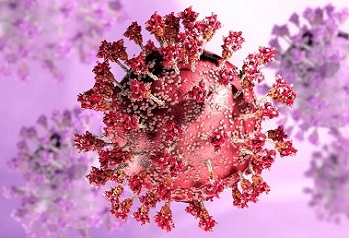BREAKING Medical News! Crisis Unfolding - New Feline-Canine Coronavirus Hybrid Sparks Global Concern Among Scientist Despite Attempted Coverups!
Nikhil Prasad Fact checked by:Thailand Medical News Team Nov 25, 2023 1 year, 4 months, 3 weeks, 4 days, 14 hours, 40 minutes ago
The novel hybrid coronavirus that first emerge in early 2023 in Cyprus has killed thousands of cats and has now been found in UK as well and could be spreading silently across Europe and is also possibly evolving!
Medical News: In a shocking turn of events, a novel coronavirus is wreaking havoc among the feline population, with a particularly devastating outbreak on the Mediterranean island of Cyprus. The virus, named FCoV-23, has raised concerns among scientists as it marks the first documented case of a cat coronavirus merging with a highly virulent canine pathogen, pantropic canine coronavirus (pCCoV). This unprecedented recombination has led to a perfect storm of both disease severity and transmissibility, leaving thousands of cats in Cyprus at risk. Moreover, the virus has now been identified in the United Kingdom, indicating the potential for global spread.
 The Cyprus Outbreak
The Cyprus Outbreak
The crisis began earlier this year when veterinarians in Cyprus noticed a significant increase in cases of feline infectious peritonitis (FIP), a condition caused by a type of cat coronavirus. Initially, estimates suggested nearly 300,000 cat deaths, but this number was later revised to around 8,000. The Cypriot government, in a bid to combat the outbreak, authorized the use of molnupiravir, a human SARS-CoV-2 medication, for veterinary purposes.
Strangely, while mainstream concentrated extensively on the outbreak of H5N1 among cats in Poland and South Korea, there was literally no
Medical News coverage about the emergence of this novel hybrid coronavirus that was wreaking havoc among the cat population in Cyprus and about even individuals supposedly getting infected by this virus.
https://www.thailandmedical.news/news/breaking-h5n1-news-discovery-of-h5n1-virus-in-cat-food-in-south-korea-sparks-inquiry-about-virus-ability-to-withstand-extreme-conditions
https://www.thailandmedical.news/news/breaking-h5n1-news-h5n1-virus-strain-found--in-cat-food-in-poland-with-mutations-e627k-and-k526r-had-evolved-to-better-infect-canines-and-cats
Identification of FCoV-23
Researchers from the University of Edinburgh, in collaboration with local veterinarians, conducted extensive studies to understand the origin and characteristics of the new virus. They identified FCoV-23, a previously undescribed feline coronavirus that had incorporated genetic information from the highly virulent pCCoV. This recombination, specifically in the spike protein - a crucial structure coronaviruses use to enter host cells – has given rise to a virus capable of causing severe FIP while still infecting the intestines and spreading through feces.
Global Spread and
Concerns
While the extent of FCoV-23's spread remains unclear, one confirmed case has already been identified in the United Kingdom, raising concerns about the potential for further international transmission. Dr. Margaret Hosie, a virologist at the University of Glasgow, emphasizes the importance of understanding how FCoV-23 spreads and causes disease, urging a comprehensive approach to epidemiological studies.
Unprecedented Nature of FCoV-23
The emergence of FCoV-23 underscores the complex dynamics of coronavirus evolution and transmission. Unlike previous cases of cross-species transmission between feline and canine coronaviruses, FCoV-23 presents a unique challenge due to its hybrid nature. Virologists express both excitement and concern about the potential implications for feline and, possibly, human health.
Detailed Analysis of FCoV-23
Genomic analysis of FCoV-23 reveals a recombination event that involves a large fragment spanning the spike gene, showing 97% sequence identity to the pantropic canine coronavirus CB/05. The outbreak in Cyprus, which began in January 2023, demonstrated a rapid increase in FIP cases across the island, peaking in various districts by March. The outbreak's severity and scale prompted the government's approval of human coronavirus medications for veterinary use.
https://www.biorxiv.org/content/10.1101/2023.11.08.566182v2.full.pdf
Comparisons with Previous Coronaviruses
The study draws comparisons with previous coronavirus outbreaks, such as SARS-CoV, MERS-CoV, and the ongoing SARS-CoV-2 pandemic, highlighting the interconnected nature of coronaviruses across species. FCoV-23 adds a new layer of complexity, emphasizing the need for a broader understanding of viral evolution and transmission.
Structural and Genetic Features
The spike protein of FCoV-23 plays a crucial role in its pathogenicity. The virus lacks the furin cleavage site (FCS) at the S1/S2 interface, a feature shared with other FCoVIIs and pCCoVs. However, an interesting observation is the deletion of domain 0, a region associated with sialoside binding, potentially affecting virus release and transmission. Structural modeling and genetic analysis indicate significant changes that may contribute to FCoV-23's enhanced pathogenicity, including a high rate of neurological symptoms.
Global Concerns and Future Research
As the FCoV-23 outbreak raises global concerns, researchers are collaborating to investigate the prevalence, transmission, and fatality rate of the virus in Cyprus. The high number of unowned cats and the frequent relocation of these cats to other parts of the world pose a significant risk for the spread of the virus. The first confirmed case in the UK underscores the need for preventive measures and the development of vaccines to curb the potential panzootic impact of FCoV-23.
https://www.bva.co.uk/news-and-blog/news-article/case-of-feline-coronavirus-identified-in-the-uk/
Conclusion
The emergence of FCoV-23, a recombined feline-canine coronavirus with the potential for severe disease and transmission, has brought a new dimension to the ongoing challenges posed by coronaviruses. The global scientific community is on high alert, emphasizing the importance of comprehensive research, preventive measures, and international collaboration to contain and understand the implications of this novel virus. As the veterinary world grapples with FCoV-23, the lessons learned from this unique case could offer valuable insights into the broader landscape of viral evolution and zoonotic threats.
Thailand
Medical News would like to add that there has been coverups about humans also contracting infections from the new novel hybrid coronavirus in Cyprus and strangely the WHO and ECDC has ben very silent about this despite the emergence of this virus since early 2023! Furthermore, there are unsubstantiated reports/claims that a recombinant event involving this new strain and a SARS-CoV-2 sub-lineage has occurred in Romania with the new recombinant variants even now found in Russia!
Thailand
Medical News will be investigating these claims and also be providing more updates on this novel hybrid coronavirus.
For the latest
Medical News, keep on logging to Thailand
Medical News.
Read Also:
https://www.thailandmedical.news/news/h5n1-news-domestic-cats-infected-with-h5n1-avian-flu-in-austria--eu-authorities-covering-up-sporadic-humans-infections-in-europe
https://www.thailandmedical.news/news/scientists-warn-sars-cov-2-infections-in-animals-are-turning-out-mutations-that-are-detrimental-to-humans-such-as-the-leu452met-amino-acid-exchange
